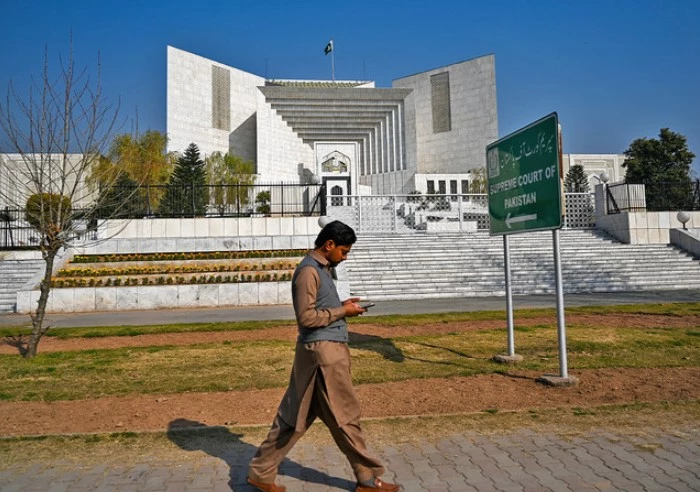SC rejects PDM govt’s objection to bench hearing audio commission case

Stay tuned with 24 News HD Android App

The Supreme Court has rejected the PDM government's objections to the bench which was hearing a set of petitions challenging the alleged Audio Leaks Inquiry Commission, saying that the government petition was filed to harass the bench, reported 24NewsHD TV channel.
The court said that the purpose of the objection was to separate the Chief Justice of Pakistan from the bench, adding that the government’s petition is an attack on the judiciary.
Justice Ijazul Ahsan pronounced the reserved verdict on Friday which declared the objections "an attack on the independence of judiciary". The miscellaneous application is denied, the verdict said.
Later the apex court issued the 32-page judgement authored by Chief Justice of Pakistan (CJP) Justice Umar Ata Bandial.
The SC five-judge larger bench led by Chief Justice Bandial and comprising Justice Ijazul Ahsan, Justice Munib Akhtar, Justice Hassan Azhar Rizvi and Justice Shahid Waheed had earlier reserved its decision on the government's miscellaneous petition.
The detailed judgment said that the objections raised against the three judges had no weight in the eyes of law. The objection petition was not filed in good faith rather it was filed to harass a member of the bench. The court noted that the federal government delayed the case by using various tactics.
The judgment said that the federal government delayed the court decisions by various tricks and tactics and contempt of court was committed. The series of contempt of court started on March 1, 2023 when it was said to have rejected the Speaker's petition by a majority of four to three. Instead of challenging the April 4 decision, the federal government hid behind the Election Commission's review appeal. Its aim was to justify its inaction. Parliament then passed the Supreme Court Review of Judgments and Orders Act. The Review of Judgments and Orders Act has been declared unconstitutional by the Supreme Court.
The Supreme Court said in the judgment that the federal government had filed petitions to remove judges from several constitutional cases. An application was also filed in the Audio Leaks Commission on the same frivolous grounds of conflict of interest and bias. The purpose of filing the objection petition against the audio leaks case was to remove the Chief Justice of Pakistan from the bench. The federal ministers made rhetoric against the judges hearing various cases.
The judgment of the Supreme Court further stated that the federal ministers made provocative statements at public forums in the case against the elections in the provincial assemblies. The ministers’ provocative statements were meant to reinforce the federal government's agenda. The Supreme Court tolerated these cases of the federal government with great restraint and patience. A final court decision must be obeyed and consequences are given in the constitution for not implementing the decision. The miscellaneous petition is an attack on the judiciary. The miscellaneous application is denied. The miscellaneous petition was filed to discredit the Bench Judges and it was filed for ulterior motives.
The judgment said that the court showed restrain on the non-cooperation in the implementation of the decisions by the federal government. No disciplinary action was taken against the federal government for disobeying the court decision. After the audio leaks came to light, the federal government and allied parties threatened court decisions and action. Some judges were also verbally attacked. An example of the attack on judges came on May 15, when the court was hearing the Election Commission's review appeal against its April 4 decision.
The judgment further said that on April 4, the Supreme Court had ordered to hold elections in Punjab on May 14. On May 15, coalition parties of the government staged an aggressive demonstration outside the Supreme Court. In the aggressive demonstration, serious threats were made to the Chief Justice of Pakistan. The purpose of threatening the Chief Justice of Pakistan was to put pressure on the judiciary.
The court in the written judgment said that the sad thing is that the protest was banned in the Red Zone area. The federal government provided facilities for holding the rally. The government machinery facilitated the protesters to enter the Red Zone. The purpose of the protest outside the Supreme Court was to put pressure on the judiciary. The power show with the help of the federal government was a direct attack on the independence of the judiciary. Under Article 19 of the Constitution, people have freedom of expression. The right to freedom of expression should be exercised judiciously.
It should be noted that the previous PDM-led government raised objections on the bench of the Audio Leaks Commission in the Supreme Court and requested to constitute a new bench. The previous federal government had objected to the bench comprising of Chief Justice Umar Ata Bandial, Justice Ijazul Ahsan, Justice Munib Akhtar and filed a separate petition in the petition case against the Audio Leak Commission.
In the petition, it was said that Chief Justice Bandial, Justice Ahsan and Justice Akhtar should not hear the case of audio leaks.
An audio leak before the Inquiry Commission is related to the mother-in-law of the Chief Justice and according to court decisions and the Code of Conduct of Judges, a judge cannot hear the case of his relative.
In the previous PDM government's separate petition, it was further stated that in the past, Chief Justice Iftikhar Chaudhry had recused himself from the bench in the Arsalan Iftikhar case.
Similarly, other audio leaks are also related to Justice Ijazul Ahsan and Justice Munib Akhtar, so a new bench should be constituted for hearing.
Reporter Amanat Gishkori
